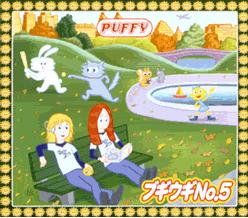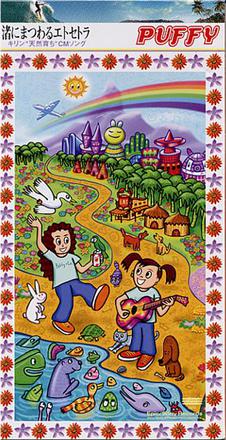Marvin Andrew Sturmer is an American musician, singer, songwriter, and composer who co-founded the rock band Jellyfish in 1989. He was the group's lead vocalist, drummer, and primary songwriter. Following their break-up in 1994, Sturmer became involved with Tamio Okuda, as writer and producer for the Japanese pop duo Puffy AmiYumi. Although Sturmer maintains a low public profile, he continues working as a songwriter for cartoons produced by Disney and Cartoon Network.

An Illustrated History is the second North American album release by Japanese pop group Puffy AmiYumi, released on May 21, 2002..

Nice is an album by Japanese pop group PUFFY, released in 2003 it is their third North American album. The US release featured a few track changes: "Atarashii hibi" and "Tomodachi" were replaced with "Urei", "Teen Titans Theme" and "Planet Tokyo", an English song with the melody of "Akai buranko". The album peaked at No. 20 on the Japanese Albums Chart.

Hi Hi Puffy AmiYumi is an American animated television series created by Sam Register and produced by Renegade Animation and Cartoon Network Studios, which aired on Cartoon Network from 2004 to 2006. The series stars fictionalized and animated versions of the Japanese pop rock group Puffy AmiYumi. The series premiered on November 19, 2004, and ended on June 27, 2006, with a total of three seasons and 39 episodes, leaving a total of 34 episodes aired and five episodes unaired in North America.

Hi Hi Puffy AmiYumi is a compilation album by pop duo Puffy AmiYumi, released in 2004. It was compiled to tie in with the group's animated series of the same name. There is also a Japanese version of this CD, of which contains the subtitle, "Happy Fun Rock Music from the Series" and includes two additional "TV Mix" tracks. The album peaked at #49 on the Japanese Albums Chart.

Yumi Yoshimura is a Japanese singer, best known as a member of the pop duo PUFFY, along with Ami Onuki.

Ami Onuki is a Japanese singer and a member of J-pop group PUFFY, along with Yumi Yoshimura.

Puffy is a Japanese pop rock duo formed in Tokyo in 1995, consisting of singers Ami Onuki and Yumi Yoshimura. In the United States, they adopted the name Puffy AmiYumi to avoid legal naming conflicts with Sean Combs, who also performed under the name Puffy. They sing in Japanese and English.

"Hurricane" is the 15th single released by Japanese pop duo Puffy AmiYumi. It is a cover of a song originally performed in 1981 by "Chanels". The song contains MIDI instruments and brass instruments. The subway version is featured in the album Music from the Subway.

"Boogie Woogie No.5" is the 12th single released by Japanese pop duo Puffy AmiYumi with the Tokyo Ska Paradise Orchestra on September 27, 2000.
"Umi e to" is the 11th single released by Japanese pop duo Puffy AmiYumi on April 5, 2000.
"Yume no tame ni" is the tenth single released on June 9, 1999, by Japanese pop duo Puffy AmiYumi on the album Fever Fever.

"Tararan/Puffy no Tourmen" is the seventh single released by Japanese pop duo Puffy AmiYumi. It was released on August 29, 1998. The music video has Ami and Yumi singing, interspersed with scenes of a traveling polar bear.

"Ai no shirushi" is the 6th single released by Japanese pop duo Puffy AmiYumi. It was released on March 14, 1998. This song was written and composed by Masamune Kusano of band Spitz. Some of this song was played in the film Waterboys. They also sang a Chinese Mandarin version of it on their album The Very Best of Puffy/AmiYumi Jet Fever. Captain Funk also did a remix of it on their album An Illustrated History. There was also a special version of the song sung for the Drummania game. This song was also featured on the live action movie Lovely Complex. A portion of the song was also featured in the Hi Hi Puffy AmiYumi episode "The Phantom of Rock."

"Mother/Nehorīna Hahorīna" is the fifth single released by Japanese pop duo Puffy AmiYumi. It was released on December 12, 1997. The music video features Ami and Yumi playing guitars and singing on a roof. Mother was used as the 1997 drama Eve's theme song.

"Nagisa ni Matsuwaru Et Cetera" is the 4th single released by Japanese pop duo Puffy AmiYumi on April 4, 1997. In the first episode of the Japanese drama "Love Generation", Matsu Takako and Kimura Takuya sing karaoke to this song while doing the punching moves from the music video.

"Kore ga Watashi no Ikiru Michi" is the 2nd single released by the Japanese pop duo Puffy AmiYumi on October 7, 1996. It sold over 1.5 million copies and was their first #1 hit. They won "Japan Record Award for Best New Artist" in 1996.

The discography for Japanese pop/rock duo Puffy AmiYumi consists of 12 studio albums, 4 compilation albums, 2 remix albums, 12 video albums and 32 singles. Their first single Asia no Junshin became an instant hit in Japan where it sold more than a million records and help to catapult the group. Jet-CD is their most successful album, Kore ga watashi no ikiru michi is their most successful single. They have sold more than 15 million records worldwide.

"Circuit no Musume" is the third single released by Japanese pop duo Puffy AmiYumi on March 12, 1997. The single was one of few releases to gain a #1 hit, with singles "Kore ga Watashi no Ikirumichi", "Nagisa ni Matsuwaru Et Cetera", and album Jet-CD. The single's cover design, when put alongside the right side of the cover from the single "Nagisa ni Matsuwaru Et Cetera", create a single picture together.












